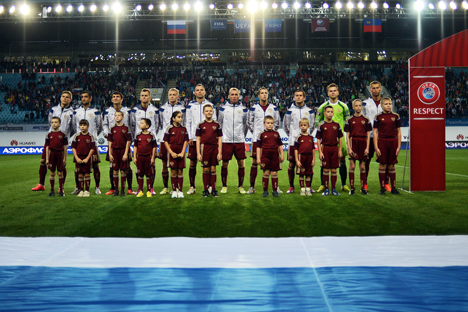
Players of the Russian national football team photographed prior to the UEFA Euro 2016 qualifier between Russia and Liechtenstein. Source: Ramil Sitdikov / RIA Novosti
Club or country – that’s been a footballer’s dilemma for decades, a psychological battle to decide how much ambition and energy each of the two causes deserve.
That could all change in 2017 – in Russia at least, club versus country battles could soon be taking place in front of spectators’ eyes each week.
For in a move alternately branded necessary, naively utopian or even absurd, Russia’s national team could be entered into the country’s Premier League, effectively forming a superclub.
The idea is the brainchild of Russian Football Union general secretary Anatoly Vorobyov, who wants Russia’s top clubs to lend their national team players to create a club for the 2017-18 season.
To most soccer fans around the world, this idea is so novel it may seem risky, even eccentric – there are competitions for clubs, and competitions for countries, carefully scheduled separately, and never the twain shall meet. So far, Russia’s soccer fans are from convinced.
The aim of Vorobyov’s unprecedented idea is to pursue national glory at the World Cup four years from now. In theory, creating this superclub, which Vorobyov has christened “Russia 2018”, will give national team coach Fabio Capello the chance to forge individual players from rival clubs into a united team capable of success on home soil.
At the 2018 World Cup, “it is clear that we will only be able to compete on the strength of team cohesion,” Vorobyov told the Itar-TASS news agency. “It’ll be offensive if we build new stadiums and the Russian team just goes out after the group stage.”
Vorobyov claims the “Russia 2018” superclub would be modeled on the success that Spain and Germany, the last two winners of the World Cup, have enjoyed with national teams heavily based on particular club sides. Barcelona’s stars knew each other inside-out when they took Spain to the trophy in 2010, much as Bayern Munich’s players did for Germany two months ago. In the 1980s, the Soviet team achieved modest success with a squad largely drawn from Dynamo Kiev.
However, dragging Russian national team players out of their clubs to create the team would effectively sabotage any hopes of clubs like CSKA Moscow and Zenit St. Petersburg achieving anything in competitions like the Champions League in the 2017-18 season. Vorobyov agrees, but pitches it as a necessary sacrifice for national prestige, such as when Soviet industry was stripped of reosurces in the 1940s to feed the development of the nuclear bomb. “Every effort was thrown at the atomic project,” Vorobyov says. “In some places, there was damage to various types of industry. But the result was that the atomic bomb was obtained.”
To the plan’s critics, such rhetoric is almost comically overblown. The World Cup final may be soccer played for high stakes, but few would claim it on the same level as a Cold War nuclear standoff, after all.
If Vorobyov’s plan becomes official Russian Football Union policy and it is implemented, it will be against the resistance of many, likely most, fans of Russia’s top clubs. There are overwhelming majorities against the superclub in polls on Russia’s top sports news websites and even Capello, who would coach the new team, met the proposal with a polite put-down. “The idea is obviously good, but it’s utopian,” he told the R-Sport news agency - effectively, it would be nice, but it isn’t going to happen.
Critics, including most of Russia’s top sports journalists, point out that there are crucial differences between the would-be superclub and its models in Barcelona and Munich. In 2010, the victorious Spanish team was made of players who had been together not just for one season, but since childhood.
A legendary level of team cohesion allowed Spain to dazzle with the non-stop passing style known as tiki-taka, but that system had been developed at Barcelona’s legendary La Masia academy for years. Bayern Munich’s academy is not quite as effective, but many German stars have played together with club and country for large parts of their lives. Trying to mimic that in one season with Russian players would not magically mean that players develop the near-psychic connections found in those world-beating teams.
The plan also carries some major risks. At a time when Russia’s relationship with soccer’s European governing body UEFA and world authority FIFA is under strain over the issue of incorporating Crimean clubs, breaking down the club/country divide would be a provocative move. Other major football nations would be bound to see it as an attempt to game the system, to avoid the world football calendar’s limitations on how many days a national team squad can train together.
It’s unlikely the superclub plan would ever have seen the light of day had it not been for Russia’s dismal world cup campaign in Brazil, which ended after the group stage with defeat to Belgium and ties with South Korea and Algeria. That prompted a crisis at the Russian Football Union, with rumors of boardroom coups and frantic brainstorming for ideas to improve.
The superclub is untested and facing such opposition that, as yet, it seems almost destined never to happen. Still, a radical solution is needed if Russia is to avoid a fiasco on the field in 2018.
Vorobyov may never see his idea become reality, but simply by airing it, he may have helped broaden the debate and bring Russia closer to an answer to its troubles on the soccer pitch.
All rights reserved by Rossiyskaya Gazeta.
Subscribe
to our newsletter!
Get the week's best stories straight to your inbox